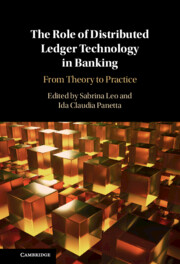Book contents
- The Role of Distributed Ledger Technology in Banking
- The Role of Distributed Ledger Technology in Banking
- Copyright page
- Dedication
- Contents
- Figures
- Tables
- Boxes
- Contributors
- Acknowledgements
- Introduction
- Part I Why Pay Attention to Distributed Ledger Technology in Banking?
- Part II Opportunities and Challenges in Crypto-Asset Regulation
- 3 Some Reflections on the Proposed MiCA Regulation
- 4 Crypto-Assets in Banks
- 5 Cyberlaundering, VASPs’ Regulation, and AML Policy Response
- Part III The Power of Distributed Ledgers in Payments
- Part IV Enabling Financial Inclusion and ESG with Distributed Ledger Technology
- Part V A Further Look at DLT in Banking: Lessons Learned, Current Applications, and Future Scenarios
- Index
- References
3 - Some Reflections on the Proposed MiCA Regulation
from Part II - Opportunities and Challenges in Crypto-Asset Regulation
Published online by Cambridge University Press: 26 October 2023
- The Role of Distributed Ledger Technology in Banking
- The Role of Distributed Ledger Technology in Banking
- Copyright page
- Dedication
- Contents
- Figures
- Tables
- Boxes
- Contributors
- Acknowledgements
- Introduction
- Part I Why Pay Attention to Distributed Ledger Technology in Banking?
- Part II Opportunities and Challenges in Crypto-Asset Regulation
- 3 Some Reflections on the Proposed MiCA Regulation
- 4 Crypto-Assets in Banks
- 5 Cyberlaundering, VASPs’ Regulation, and AML Policy Response
- Part III The Power of Distributed Ledgers in Payments
- Part IV Enabling Financial Inclusion and ESG with Distributed Ledger Technology
- Part V A Further Look at DLT in Banking: Lessons Learned, Current Applications, and Future Scenarios
- Index
- References
Summary
This contribution discusses some critical aspects of the upcoming Markets in Crypto-assets (MiCA) Regulation. There is already extensive and comprehensive literature on the MiCA proposal, and the scope of these brief notes is to consider some – necessarily not all – of the issues that MiCA (as it stands in the original proposal) raises, and that might be considered in the next steps of the legislative process. In particular, we discuss the relationship between MiCA and MiFID-Prospectus rules, the issues raised by DeFI, tokenisation of assets, and some general commercial and civil law aspects.
- Type
- Chapter
- Information
- The Role of Distributed Ledger Technology in BankingFrom Theory to Practice, pp. 71 - 89Publisher: Cambridge University PressPrint publication year: 2023

